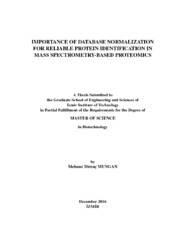Please use this identifier to cite or link to this item:
https://hdl.handle.net/11147/5710Full metadata record
| DC Field | Value | Language |
|---|---|---|
| dc.contributor.advisor | Allmer, Jens | - |
| dc.contributor.advisor | Yalçın, Talat | - |
| dc.contributor.author | Mungan, Mehmet Direnç | - |
| dc.date.accessioned | 2017-06-07T06:56:35Z | - |
| dc.date.available | 2017-06-07T06:56:35Z | - |
| dc.date.issued | 2016-12 | - |
| dc.identifier.citation | Mungan, M. D. (2016). Importance of database normalization for reliable protein identification in mass spectrometry-based proteomics. Unpublished master's thesis, İzmir Institute of Technology, İzmir, Turkey | en_US |
| dc.identifier.uri | http://hdl.handle.net/11147/5710 | - |
| dc.description | Full text release delayed at author's request until 2018.01.27 | en_US |
| dc.description | Includes bibliographical references (leaves: 30-37) | en_US |
| dc.description | Text in English; Abstract: Turkish and English | en_US |
| dc.description | xi, 37 leaves | en_US |
| dc.description | Thesis (Master)--Izmir Institute of Technology, Biotechnology, Izmir, 2016 | en_US |
| dc.description.abstract | One of the revolutionary steps towards proteomics, was introducing mass spectrometry to protein inference analysis. Its powerful aspects such as speed, and accuracy towards identifying and quantifying proteins have made it the first choice to obtain highthroughput data. Due to development of a variety of fragmentation techniques, mass spectrometry-based analysis even made it possible to acquire knowledge about single polymorphisms and modifications of amino acids of a peptide. Although this technology provides enormous amounts of data, identification of the proteins is still a hard challenge to overcome due to the shortcomings of computational methods. Herein a novel methodology is offered to better analyze mass spectrometry data and overcome the deficiency of protein identification algorithms in terms of speed and accuracy. When the spectral data is acquired from an organism by mass spectrometry, database search algorithms are used for protein identification if the protein sequences of the organism are known. These algorithms compare the experimental data from mass spectrometry analysis to theoretical data gathered from known databases of organism to try and find the best match by ranking the PSMs via scoring functions. Since the databases can be too large to search and multiple databases with different sizes can contain the peptides of experimental data, database search algorithms may fail to produce fair, fast or complete results. In this work a methodology is presented to overcome unfair scoring of peptides in different size databases and enable database search algorithms to utilize relatively big sized entries such as human chromosome six frame translations. In terms of speed and accuracy the method is found to be better than some of the existing methods. | en_US |
| dc.description.abstract | Protein tanımlaması çalışmalarında kütle spektrometrinin kullanılması proteomik alanındaki devrim niteliğindeki adımlardan biri oldu. Protein nicelik ve nitelik belirlemelerindeki doğruluk ve hızlı olması gibi özellikleriyle, yüksek-işleme veri alımında kullanılmak üzere ilk seçim haline geldi. Farklı fragmentasyon yöntemlerinin geliştirilmesiyle, kütle spektrometri tabanlı analizler, bir peptiddeki tekli polimorfizmleri ve amino asitlerdeki modifikasyonlarla ilgili bilgi edinilmesini bile mümkün kıldı. Bu teknolojinin muazzam ölçülerde veri üretmesine rağmen, protein tanımlama çalışmaları, hesaplamalı metodların eksikliklerinden dolayı, aşılması güç bir hedef halinde. Bu çalışmada, protein tanımlama algoritmalarının protein belirlemedeki eksikliklerinin üstesinden gelmek ve kütle spektrometri verilerini hız ve doğruluk yönlerinden daha iyi analiz etmek için orjinal bir algoritma önerilmiştir. Bir organizmadan kütle spektrometri aracılığıyla spektral veri elde edildiğinde, eğer organizmanın protein sekansları bilinmekteyse, protein tanımlaması için veritabanı arama algoritmaları kullanılır. Bu algoritmalar, peptid-spektrum eşleşmelerindeki en iyi eşleşmeyi skorlama fonksiyonlarına gre bulmak için, kütle spektrometri analizlerinden alınan deneysel verileri, organizmaya ait veritabanlarından elde edilen teorik verilerle karşılaştırır. | en_US |
| dc.language.iso | en | en_US |
| dc.publisher | Izmir Institute of Technology | en_US |
| dc.relation | Alternatif Açık Okuma Çerçeveleri’ne Ait Yeni İnsan Proteinlerinin Tespiti ve Doğrulanması | en_US |
| dc.rights | info:eu-repo/semantics/openAccess | en_US |
| dc.subject | Protein identification | en_US |
| dc.subject | Mass spectrometry | en_US |
| dc.subject | Database search algorithms | en_US |
| dc.subject | Proteomics | en_US |
| dc.title | Importance of Database Normalization for Reliable Protein Identification in Mass Spectrometry-Based Proteomics | en_US |
| dc.title.alternative | Kütle Spektrometri Tabanlı Proteomik Çalışmalarındaki Güvenilir Protein Tanımlanmasında Veritabanı Normalizasyonunun Önemi | en_US |
| dc.type | Master Thesis | en_US |
| dc.institutionauthor | Mungan, Mehmet Direnç | - |
| dc.department | Thesis (Master)--İzmir Institute of Technology, Bioengineering | en_US |
| dc.request.email | mehmetdirencmungan@gmail.com | - |
| dc.request.fullname | Mehmet Direnç Mungan | - |
| dc.relation.publicationcategory | Tez | en_US |
| dc.identifier.wosquality | N/A | - |
| dc.identifier.scopusquality | N/A | - |
| item.openairecristype | http://purl.org/coar/resource_type/c_18cf | - |
| item.languageiso639-1 | en | - |
| item.openairetype | Master Thesis | - |
| item.grantfulltext | open | - |
| item.fulltext | With Fulltext | - |
| item.cerifentitytype | Publications | - |
| Appears in Collections: | Master Degree / Yüksek Lisans Tezleri | |
Files in This Item:
| File | Description | Size | Format | |
|---|---|---|---|---|
| T001562.pdf | MasterThesis | 1.83 MB | Adobe PDF |  View/Open |
CORE Recommender
Page view(s)
262
checked on Mar 31, 2025
Download(s)
220
checked on Mar 31, 2025
Google ScholarTM
Check
Items in GCRIS Repository are protected by copyright, with all rights reserved, unless otherwise indicated.